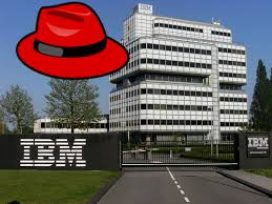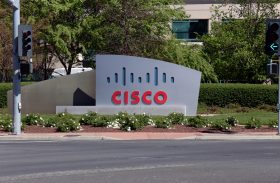IBM Bets Farm on $34B Red Hat Deal

IBM, the company with a 100-year history, is betting all of its cash and a substantial amount of debt on the future of the cloud, as it announced Sunday night that it's buying Red Hat (RHAT) for $34 billion or $190 per share.
Red Hat shared skyrocketed on the deal, up +55.27 (+47.37%) 171.95 in midday trading on Monday, but shares are still short of the $190 deal price. Due to the heavy cost of the deal, IBM shares fell -2.39 (-1.92%) to $122.40.
What makes the deal even more remarkable is the high premium paid for Red Hat in the midst of a steep market correction, especially technology shares.
IBM touted the move as a bid to become the leader in hybrid cloud. Red Hat has a strategically strong position in cloud technologies, with wide market adoption of its own distribution of Linux in addition to many cloud management tools including OpenShift, Red Hat's platform for managing Kubernetes container applications which have emerged as a de facto standard in the cloud.
Because of Red Hat's strong position in cloud, it has been subject to numerous takeover rumors over the years. Some financial analysts, including Stifel Financial, issued research notes today saying other bidders could still yet emerge. For example, Microsoft (MSFT), which has moved aggressively into the cloud and shifted its focus to Linux, could still emerge as a bidder.
"Google, Amazon, and Microsoft (and potentially Oracle) have the strategic motivations and financial resources to consummate such a transaction and would not be surprised if we were to see one of them make a competing bid," said the research note from Stifel.
For IBM, which has struggled as a second-tier cloud player behind the likes of Amazon (AMZN), Google (GOOG), and Microsoft (MSFT), it represents a huge bet and risk. IBM has been struggling in recent years and its share price has gone nowhere, while the fortunes of Amazon and Microsoft have risen. IBM is using all of its cash in the deal and says it will issue more debt in order to complete the transaction. IBM had about $15 billion in cash and $47 billion in debt on its balance sheet.
For Red Hat, the deal is marker of the company's huge success. The company went public in the tech bubble days of 1999 with its unique model of distributing the standard Linux operating system and offering supplemental service and support. This approach has now been widely emulated in the industry and referred to as the "Red Hat model" as the cloud moves to more open-source code that requires key integrators and support agents to help companies build out their public and private cloud operations.
Red Hat has also become a force in the telecommunications infrastructure business with its Linux distribution as well as its own flavor of Open Stack, the open-source cloud platform.
For IBM, which has always acquired many tech company shown limited success in integration, investors will watch carefully for evidence on whether the deal is going to work. IBM CEO Ginni Rometty is clearly betting her and the company's future on Red Hat.













